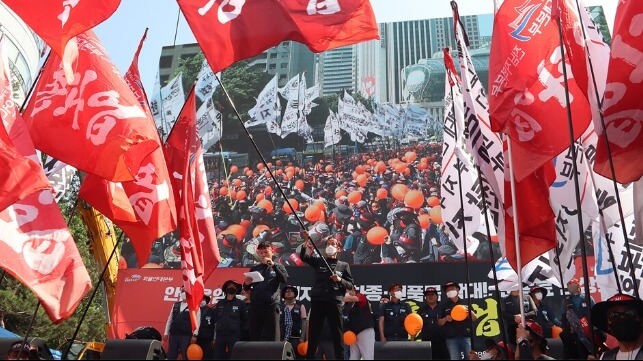Korean Ports and Industry Slow on Day 5 of Truckers’ Strike

The South Korean government and the striking truckers’ union held their first talks on Monday, November 28, with both sides reporting there was no progress toward settling the five-day-old strike. While more talks are scheduled for Wednesday, the government’s patience with the strikers appears to be wearing thin with threats of a back-to-work order or other efforts to break the strike as the disruptions grow at the ports and across major industries.
While only representing a small fraction of South Korea’s truck drivers, the union has a strategic position within the Korean economy. Its drivers handle much of the container traffic in and out of the main ports as well as deliveries to key industries including steel, automotive, and construction. The union’s membership has grown also with tank truck drivers meaning they are impacting the flow of gasoline. They also drive the auto carriers use at the vehicle manufacturing plants.
While the strike only began at the end of last week, it already has had an increasing impact on key industries raising concern among government officials. Reports said container movement was at a quarter of normal levels on Monday morning at the ports. At the same time, major steel manufacturers said their shipments are failing. Gasoline is already reported to be in short supply in some places and construction sites are reporting they are running out of materials including concrete. Appealing to South Korea’s Industry Minister during a visit to a concrete factory the industry said it has already missed $35 million in deliveries and could be forced to suspend operations later this week. Government officials are estimating that the strike is costing the economy as much as $225 million each day.
It is the second strike by the drivers in less than six months and is again centering on the same issues of minimum wages and working conditions. The union is demanding that the government extend a law due to expire at year’s end that sets minimum freight rates in key industries as well as extend it to cover more industries. The drivers cite the rising costs, especially of fuel saying they need higher wages. The strike in June was settled with a promise that the government would consider these extensions.
Industry Minister Lee told reporters that the government will seek measures to resume vehicle operations and to minimize the impacts. While the government has already moved to impose the back-to-work order which comes with steep fines, suspensions of driver’s licenses, and possible jail time, Lee said they would also consider mobilization of military vehicles if needed.

that matters most
Get the latest maritime news delivered to your inbox daily.
South Korean President Yoon Suk-yeol Yoon has been critical of strikes in the past. Today, Reuters is reporting that his office said “We need to establish a rule of law between labor and management." Earlier this year, during the truckers’ strike and a sit-in at the Daewoo Shipbuilding yard, the government also said it was prepared to tack action but the strikes ended without force with the unions agreeing to corporate and government demands.
The International Transport Workers’ Federation issued a statement in support of the strikers while appealing to the International Labor Organization and the UN for urgent intervention to halt government violations of workers’ rights. The union contends that the government has already positioned police and has prepared replacement drivers and military vehicles. While talks were scheduled for Wednesday, November 30, the union says the cabinet will move tomorrow in advance of the next round of talks to order the drivers back to work.
